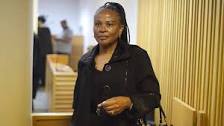SAMSON LEHLOGONOLO MAKALELA LEGAL OPINION

SAMSON LEHLOGONOLO MAKALELA, LLB (Hons)
Department of Private Law, University of South Africa, Pretoria
The author and the publisher believe on the strength of due diligence exercised that this work does not contain any material that is the subject of copyright held by another person. In the alternative, they believe that any protected preexisting material that may be comprised in it has been used with appropriate authority or has been used in circumstances that make such use permissible under the law.
|
FACTUAL BACKGROUND
Elsa (ID No: 7008255060086) met her husband John Pitt (ID No: 6805166070087) when both of them were at the University of Cape Town. John graduated with an engineering degree at the end of 1990 and Elsa left university without graduating, having completed a second year BA majoring in Sociology; Elsa left university in order to marry John. The wedding took place on 25 January 2001 at the Moederkerk in Stellenbosch. At the time neither of them had any assets apart from their personal effects and textbooks.
Prior to getting married they concluded an antenuptial contract (ANC') in terms of which they were to be married out of community of property and subject to the accrual system as contemplated in section 2 of the Matrimonial Property Act, 84 of 1984 (‘the Act'). They recorded in the ANC that the value of each of their respective estates, for purposes of the accrual system, was nil.
Immediately after they were married, John started an engineering company in Bellville in the Western Cape which was successful and grew. By February Elsa had fallen pregnant and she gave birth to a boy Bratt Pitt on 10 October 2001. From the outset Elsa had no formal employment but she assisted John in his business by doing the books and answering the telephone. She also entertained his business clients by hosting cocktail and dinner parties. She was never paid for her efforts.
She estimates John's business to be worth R1 million and the value of their house and its contents at another R1 million. The house is registered in John's name and the contents of the house were purchased by him as well.
After Bratt went to school in 2008, Elsa inherited R200 000, 00 which Elsa deposited in a long-term savings account, where it has accumulated compound interest totaling R100 000, 00. She also started a small business making up and delivering floral arrangements in Bellville. The business thrived and grew into a substantial concern. Whilst she was building up this business (with no help from John), Elsa continued to assist John in his business as before. Elsa recently received an offer from a competitor to purchase her business for R3 million. The parties have no other assets worth mentioning.
Bratt is now in Grade 6 and has at least another six years at school. He is a bright child and is expected one day to go to university. John would not be able to look after Bratt because of his business commitments and it would be in the child's best interests that custody be awarded to Elsa.
The reasons for Elsa seeking a divorce are that on John's return from a "business trip" to Warmbaths, Elsa found a love letter from a certain Petal Prinsloo in which Petal lovingly recorded their time together at the nudist colony "Natures Valley", outside Warmbaths. Upon investigation Elsa discovered that John did not go to Warmbaths on business at all, but in order to be with Petal. When Elsa confronted John about this, he admitted that he had been having an affair with Petal for at least three years and that he intended to leave Elsa and marry Petal. He packed up and left the same day, never to return.
Elsa went to the Minister of their Church and he suggested marriage counselling, but John refused to take part in any counselling, saying that his mind was made up. Elsa has lived in Bellville throughout the course of the marriage and she still resides there. She is, however, considering moving to Kokstad in KwaZulu-Natal where she grew up, but will only do so after the divorce is granted. You are briefed to act for Elsa Jane Pitt in the matter of her divorce. But before issuing divorce summons you are instructed to draft an opinion, dealing with:
- Elsa's prospects of success in her claim for a forfeiture of benefits; and
- How much John will have to be paid in terms of the accrual system, if the court refuses to order a forfeiture of benefits.
Privileged and Confidential
CLIENT: ELSA JEANET PITT
IN RE: PROSPECTS OF SUCCESS IN PROPOSED DIVORCE ACTION
OPINION
Furnished to: MAKALELA & SEKHASEPE ATTORNEYS INC.
2210 Umtata Road
Olievenhoutbosch
Centurion
PRETORIA
Date: Tuesday, April 21, 2023
A. INTRODUCTION
- The Consultant is ELSA JANE PITT (the consultant)
- My opinion and comments have been sought with regard to the consultant’s prospect of success in a divorce action she proposes to institute against her husband Jonn Pitt (the defendant).
B. ISSUES /QUESTIONS PRESENTED
- My opinion and comments have been sought on two specified issues, namely:
- The consultants’ prospects of success in her proposed claim for a forfeiture of benefits; and,
- In the event the court refusing to grant an order for forfeiture, how much the defendant would be entitled to claim from the consultant in terms of the accrual system.
C. THE FACTS
4. The following facts are relevant to the issues:
4.1
The Consultant and the defendant were married to each other on 25 January 1998 in Stellenbosch out community of property and subject to accrual system as defined in terms of Section 2 Matrimonial Property Act 84 of 1994.
4.2
The defendant is a qualified engineer and is running a successful engineering company in Bellville which he started in 2000.
4.3
The consultant did not finish her degree and has never been no formally employed. She assists the defendant in his business by doing book, answering telephone and from time to time, entertainment of business clients
4.4
She was never paid for all her effort.
4.4
The consultant recently discovered that the defendant is involved in an adulterous relationship with one Petal. The defendant has refused counselling by their Church Minister, stating that he had made up his mind.
4.5
The consultant estimation on the value of the defendant business is R1 million and the value of their house and contents is another R1million. The house and the contents are in the defendant’s name.
4.6
The consultant inherited R200 000.00 which is in a long terms savings account and has accumulated compound interest totaling to R 100 000.00.
4.6
The consultant is running a florist business of which its value could be R3 million.
D. THE APPLICABLE LEGAL PRINCIPLES
- Section 9(1) of the Divorce Act 70 of 19792 provides that: when a decree of divorce is granted on the grounds of irretrievable breakdown of a marriage the court may make an order that the patrimonial benefits of the marriage be forfeited by one party in favour of the other, either wholly or in part, if the court, having regard to the duration of the marriage, the circumstances which gave rise to the breakdown therefore and any substantial misconduct on the part of either of the parties, is satisfied that, if the order for forfeiture is not made, the one party will in relation to the other be unduly benefited.
- The provisions of this section have been subjected to different interpretation by the courts. In the case of Matyila v Matyila3 the court held that three factors should be alleged and proved for the claim for forfeiture to succeed. Those factors are as follows:
- She and the defendant have been married for 12 years;
- The defendant has committed adultery; and,
- That the defendant has deserted her.
- According to this decision the consultant will have to prove all these three factors. If the consultant were to fail to prove one of these requirements the court would refuse forfeiture as explained in Matyila.
- However, in the case of Klerck v Klerck4 Mr. Justice Kriegler, when faced with the same question and unaware of the Matyila, decision, held that the intention of the legislature
- Secon 9(1) of the Divorce Act 70 of 1979.
- 1987 3 (SA) 230 WLD. 4 1987 3 (SA) 265 WLD.
was that the court should take all the three factors into account but that no special meaning was to be attached to the conjunctive “and”. Therefore, it was held that all three were to be weighed but a negative conclusion regarding one did not preclude the granting of relief on the strength of the others.
- This question was further dealt with n the case of Binda v Binda before Justice Levenson and Mr. Justice Myburg in an appeal against an earlier decision in the same case not to grant forfeiture order based on the reasoning in Matyila decision.
- The reasoning of the learned judges on appeal is succinctly stated in the head note of the case as reported as follows: “The appellant has sought a decree of divorces in the central divorce court, Johannesburg, as well as an order forfeiture of the benefits of the marriage in community to the respondent. The president granted the divorce decree but ordered that the joint assets be divided between the parties as he had concluded that although the evidence established that the respondent would be unduly benefited, within the meaning of the term as used in s 9(1) of the Divorce Act 70 of 1979, by refusal of an order for forfeiture of benefits, he was bounded by the decision of Matyila v Matyila to the effect of that substantial misconduct was an essential element to be proved against the party against whom the order for forfeiture was sought.”
- The court concurred with Mr. Justice Kriegler’s findings in the case of Klerck v Klerck and concluded that legislature could never have intended that all three factors need be present and proved before forfeiture can be decreed.
- The court held further that the legislature required each of the three factors be given due and proper weight in determining whether a party had been benefited unduly. Therefore, the court held further that the legislature required each of the three factors be given due and proper weight in determining whether a party had been benefited unduly. The court held that the decision in Matyila was clearly wrong and therefore that the court was not bound to follow it.
E. APPLICATION OF THE LEGAL PRINCIPLE TO THE FACTS
- In the consultant’s proposed action, the court would not be bound by the decision in Binda because it is a Full Bench decision of a different division which is binding only judges sitting alone in the same division of the court. Nevertheless, it would have great persuasive value, especially since the reasoning adopted by the learned judge cannot be faulted.
- It would appear that the assets currently held by the parties are as follows:
- R1 Million in the defendants’ business assets;
- R1 million in the house and contents;
- R3 million in the consultant’s business assets; and
- R100 000 interests together with the R 200 000 the consultant inherited.
- In terms of Section 3 of the Matrimonial Property Act 88 of 1984 the spouse whose acquires a claim against the other spouse for an amount equal to one half of the difference between accrual of the respective estates of the spouses. That would be the position in the absence of an order for forfeiture.
- The parties had no assets at the commencement of the marriage. The consultant’s inheritance has to be excluded from the calculation by virtue of section 5(1) of the Matrimonial Property Act 88 of 1984.
- My opinion and comments have been sought with regard to the consultant” prospect of success in a divorce action she proposes to institute against her husband John Pitt (the defendant).
- The consultant’s inheritance has to be excluded from the calculation by virtue of section 5
(1) of the Matrimonial Property Act 88 of 1984.
- Therefore, should the court refuse to grant an order for forfeiture of benefits in the consultant’s favour, the defendant would be entitled to claim R500 000.00 calculated as follows from her:
- Consultant’s accrued assets R3 000 000.00
- Less Defendants ‘s accrued assets R 2 000 000.00
- Equals: R1 000 000.00
- Divided by 2, Equals: R 5000 000.00
- This amount is sufficiently large, in my opinion, to warrant interference by the court and for the court to grant forfeiture of the patrimonial benefits of the marriage in favour of the consultant, having regard to the fact that the defendants conduct in committing adultery and deserting the consultant was the cause of the breakdown of the marriage.
F. CONCLUSION
21. In my opinion the consultant has good prospects of success in her proposed claim for forfeiture of benefits.
I trust you will be advised accordingly
Signature
LS MAKALELA
Chambers, Pretoria
Secon 2 of Matrimonial Property Act of 1984.
1993 (2) SA 123 (WLD).
Secon 9(1) of the Divorce Act 70 of 1979.
WritingArticles from Samson Lehlogonolo Makalela
View blog
By the time bumbling public protector Busisiwe Mkwebane lease the office, that institution will have ...

The effect of the implementation of Affirmative Action · and Equal Employment in South Africa · Mr.L ...

This article's main goal is to examine and identify weaknesses in our legal system, South African cr ...
You may be interested in these jobs
-

Meetings and Events Service Representative
Found in: Trabajos Diarios ZA C2 - 5 days ago
Continental Practice Montana Park, South Africa PermanentOur massively expanding company is hiring for a meeting and event service representative to organize a large number of meetings, conferences, and events throughout the year for internal and external partners. The ideal candidate will be able to evaluate and negotiate with vendors ...
-

Section Head: Production
Found in: Executive Placements ZA C2 - 5 days ago
TalentCru Pretoria, South AfricaDo you thrive in fast-paced production environments and have a passion for ensuring quality and efficiency? Our Client is looking for a driven Section Head: Production in Pretoria to lead their team. Translate strategy into action, manage a team, optimise processes, and ensure ad ...
-
Caregiver needed
Found in: Talent ZA C2 - 1 week ago
Care4U Retirement Johannesburg, South Africa Full timeWe are seeking an attentive and trustworthy caregiver to join our staff in providing excellent care to our clients. The caregiver will plan and follow a daily care schedule with clients, modify care plans as prescribed by medical professionals, and report on any new conditions or ...

Comments